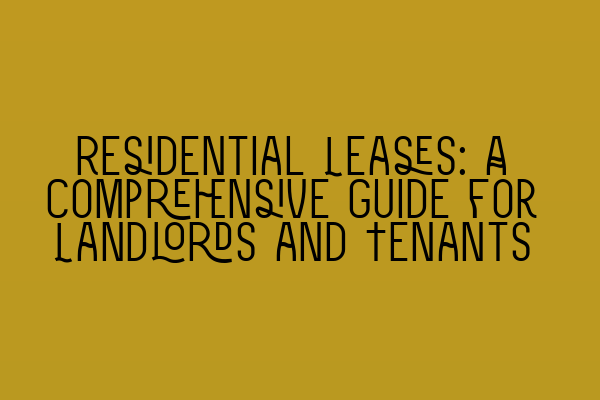Residential Leases: A Comprehensive Guide for Landlords and Tenants
Welcome to our blog post on residential leases! Whether you’re a landlord looking to rent out your property or a tenant searching for a new home, understanding the ins and outs of residential leases is essential. In this comprehensive guide, we’ll provide you with all the information you need to know about residential leases, including key terms, responsibilities, and legal considerations. So, let’s dive in!
1. What is a Residential Lease?
A residential lease is a legally binding contract between a landlord and a tenant. It outlines the terms and conditions under which the tenant can occupy the property, including the duration of the lease, rent payment details, and rights and responsibilities of both parties. Understanding these terms is crucial to ensure a smooth and mutually beneficial tenancy.
2. Types of Residential Leases
Residential leases can come in various forms, each with its own unique features. The most common types include fixed-term leases, periodic leases, and assured shorthold tenancies (ASTs). A fixed-term lease has a specific start and end date, while a periodic lease runs from month to month or week to week. ASTs are the most common form of residential tenancy in England and Wales and provide certain legal protections for tenants.
3. Key Terms in a Residential Lease
When entering into a residential lease, it’s vital for both landlords and tenants to understand the key terms and clauses outlined in the agreement. These may include the rent amount and frequency of payment, security deposit requirements, maintenance responsibilities, and provisions related to pets, smoking, and subletting. It’s crucial to read the lease carefully and seek professional advice if needed.
4. Rights and Responsibilities of Landlords
As a landlord, you have certain rights and responsibilities towards your tenants. It’s your duty to provide a safe living environment, ensure the property is in good repair, and address any maintenance issues promptly. You may also have the right to enter the property for necessary inspections or repairs, but this must be done with proper notice and within the limits of the law.
5. Rights and Responsibilities of Tenants
Tenants, too, have rights and responsibilities that they must adhere to during their tenancy. These include paying rent on time, taking care of the property, reporting any maintenance issues promptly, and adhering to the terms agreed upon in the lease. Tenants also have the right to privacy, and landlords must obtain proper consent before entering the property, except in cases of emergency.
6. Legal Considerations
Residential leases are subject to various laws and regulations to protect the rights of both landlords and tenants. As a landlord or tenant, it’s essential to be aware of these legal considerations. These may include anti-discrimination laws, eviction procedures, and rules on rent increases. Staying informed and up to date with any changes in legislation is essential to ensure compliance and avoid any legal disputes.
7. Additional Resources
If you want to further enhance your knowledge of property law and contracts, we recommend checking out our related articles:
– Interactive SQE Mock Tests for Contract Law: Test Your Knowledge
– Join Our SQE Contract Law Webinars: Expert Insights and Guidance
– Contract Law Reforms: An Analysis of Recent Changes
– Parties in a Contract: Rights and Responsibilities
– The Importance of Ethics in Contract Law: A Comprehensive Guide
8. Conclusion
Residential leases play a vital role in determining the rights and responsibilities of landlords and tenants. Understanding the key terms, legal considerations, and rights and responsibilities outlined in a lease is crucial for a harmonious and successful tenancy. Whether you’re a landlord or a tenant, we hope this comprehensive guide has provided you with valuable insights. If you have any further questions or require professional assistance, don’t hesitate to reach out to us at SQE Property Law & Land Law.
